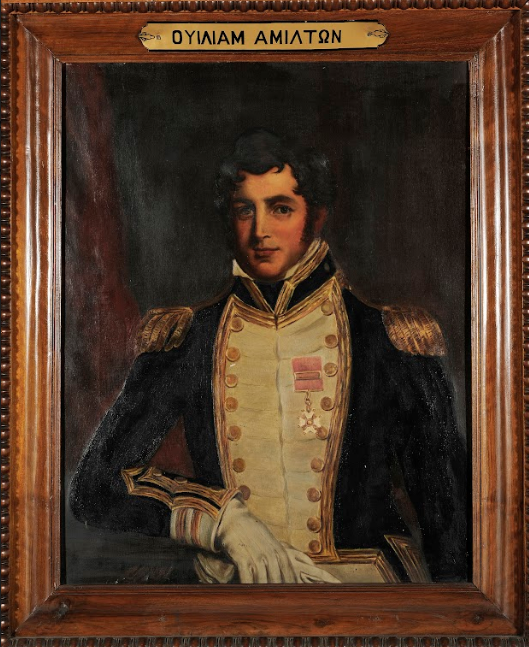Gawen William Rowan Hamilton ( 1783-1834) )

British admiral, known as Commodore Hamilton, he was the commander of a British Royal Navy squadron in the Greek seas at the time of the Greek War of Independence. In 1822, he came to Hydra as captain of the frigate Cambrian, on the orders of the autocratic commissioner of the Ionian Islands, Thomas Maitland, to demand compensation for the damages suffered by ships flying the British flag caused by the Greek revolutionary fleet. During the Greek siege of Nafplion in early 1822, he patrolled the area, treating the combatants fairly and discouraging the English consuls from supplying either Ottomans or Greeks. After Nafplion surrendered to the Greeks, he arranged for the transfer – even on-board Greek vessels – of some 500 Ottomans to Smyrna. He returned to the Greek seas in 1825 and supported the Greek cause on many occasions, encouraged by the shift in British policy effected by George Canning, with the recognition of the warring parties in 1823. When Ibrahim invaded the Peloponnese, Canning interceded many times for the release of Greek prisoners. Yet his greatest contribution to the Greek struggle was his efforts to ease the discord amongst the Greeks on the eve of the Third National Assembly at Troezen.
Two decision-making centres had emerged amidst a civil-war climate. Hamilton resented having to sail between Hermione and Aegina to reconcile the proxies into forming a single assembly and consulting with the British ambassador to Constantinople, Stratford Canning, who was responsible for negotiations on the Greek question.
Concerned when he found out that Kolokotronis supported Kapodistrias’s appointment as governor of Greece, Hamilton paid Kolokotronis a personal visit. The latter, known in Greece as the Old Man of the Morea, a seasoned diplomat, kept quiet about his intentions to save time for extending the invitation to Kapodistrias, seeking to announce it at the right time so as not to vex Britain at the crucial moment of the negotiations.
In spring 1827, however, political developments in Europe on the Greek question precipitated. Negotiations between Britain, Russia, and France for the latter’s accession to the Treaty of Saint Petersburg (April 4, 1826) were successful.
The Greek government invited the British general Richard Church, who was popular with the chieftains, to become Chief Commander of the Greek Army and the famous British admiral Thomas Cochran to become Commander of the Navy. Both accepted and arrived in Nafplion in mid-March 1827. Both Hamilton and Canning from Constantinople urged the Greeks to maintain unity and order. With the help of Church and Cochran, the two warring assemblies formed a single one at Troezen.
Taking advantage of the posting of Church and Cochran, Kolokotronis proposed to the Third National Assembly at Troezen for Ioannis Kapodistrias to become governor of the fledgling state. Then, Hamilton supported Kolokotronis’s proposal, remarking: “Take Kapodistrias, or any devil you like; otherwise, you are quite lost.” This was instrumental in overcoming the deadlock and resulted in the unanimous election of Kapodistrias as first governor of Greece on April 3, 1827.
in 1828, Hamilton left Greece for good.





